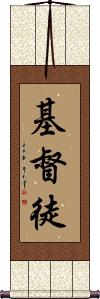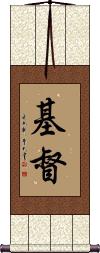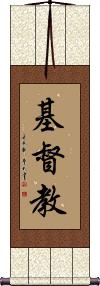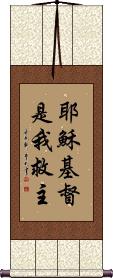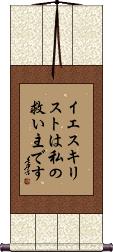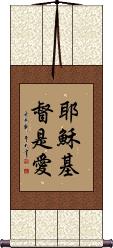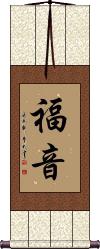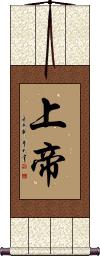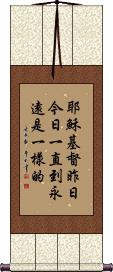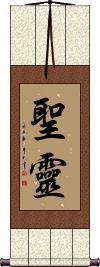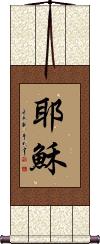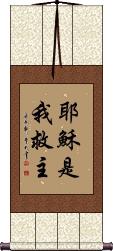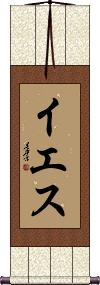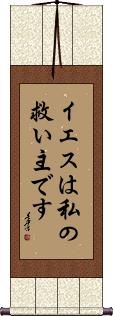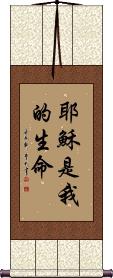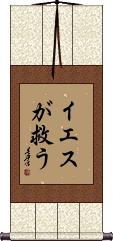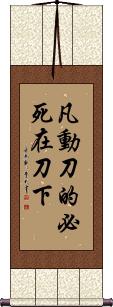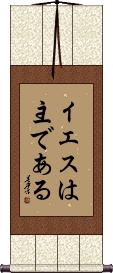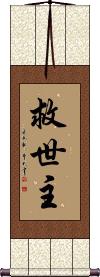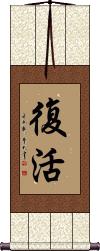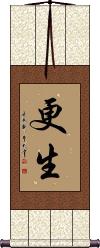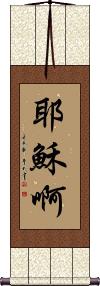Custom Christianity Chinese & Japanese Calligraphy Wall Scrolls
We can have your favorite verse from the Bible translated into Chinese and written on a wall scroll for you.
You must email your request siting the verse or verses you want (It would be an incredible amount of work to include every verse of the Bible in our Asian calligraphy database).
Here is an example: Joshua 24:15.
Seeking the word for Christ in Chinese or Japanese?
Want to tell the world that you are a Christian in ancient Chinese Characters?
Seeking other Christian-related words in Japanese or Chinese?
You've come to the right place...
1. Christian / Disciple of Christ
2. Christ
3. Jesus Christ
4. Christian
11. God of Zion / God of Abraham
12. Hebrews 13:8
14. Jesus
16. Jesus
18. Jesus is My Life
19. Jesus Saves
20. Live By The Sword Die By The Sword
21. Jesus is Lord
22. Savior / Messiah
25. Yeshua
Christian / Disciple of Christ
基督徒 is a very strong and direct word in Chinese for “Christian.”
The literal translation of the first two characters is “Christ.”
The last character means apprentice, follower, or disciple.
Altogether these three characters mean “Christ's Disciple” or “Christ's Apprentice.” 基督徒 is a pretty cool title to hang on your wall if you are a devout Christian.
Also used by Japanese Christians (but may be unfamiliar to non-Christian Japanese people).
See Also: Jesus Christ | God of Abraham
Christ
基督 is how to write “Christ” in Chinese characters, Korean Hanja, and Japanese Kanji.
This is the word used in the Chinese Union Bible (the only readily-available translation of the Bible into Chinese that I know of - published about 100 years ago). For Chinese Christians, this is the most common way to refer to Jesus Christ.
This is also the way that “Christ” is written in Japanese. But since the Japanese language is very flexible about the sounds that can be assigned to various Kanji, these characters have been assigned a pronunciation that sounds a lot like “Christ” or actually closer to the original “Christos.” In Japanese (if you don't know how the Romaji shown above in the gray box works), it sounds like “key ree sue toe” using English words/sounds. Say those four words fast, and you'll get it.
It should be noted that only Japanese Christians will be familiar with this word.
This is best defined, read, and understood with the characters together, but if you take this word for Christ apart, the first character means “fundamentals” or “foundation.” The second character can mean “leader” or “boss.”
Jesus Christ
耶穌基督 is the full version, with the name “Jesus” being the first two characters and the meaning of “Christ” as the last two.
You can't get more specific than this when referring to the Messiah.
Christian
克里斯蒂安 is the transliteration to Mandarin Chinese for the given name Christian.
See Also: Christianity
Disciple of Christianity
基督教徒 is the most verbose (longest) word for “Christian” in the Chinese and Japanese languages.
The literal translation of the first two characters is Christ.
The third Character means “Religion” or “Teaching.”
The last character means “apprentice” or “disciple.”
Altogether these three characters mean “Christ's Teaching Disciple” or “Christ's Religion Apprentice.”
Note: The last two characters are sometimes translated together as “follower (of a religion),” so you could also say it means “Follower of Christ.”
This four-character title makes it very clear what you are talking about in Chinese.
See Also: Jesus Christ | God of Abraham
Christianity / Christian
基督教 is the Chinese, Japanese and Korean word for “Christianity.”
Just as in English, this word is often used to mean “Protestant” but includes Catholics in the true definition.
It is the word used to refer to the whole “Christian religion” or “Christian Faith,” and therefore, it can be translated as “Christianity.” However, used as an adjective in regard to a person, it would translate as “Christian.” But more like saying, “His religion is Christianity,” rather than a noun form.
If you break it apart, the characters mean Base/Foundation Leading/Supervising Religion/Teaching. It makes more sense in Japanese, Chinese, and Korean. The first two characters together are translated as “Christ.” So you can also say this means “Christ's Religion” or “Christ's Teachings” when directly translated, or in reverse, “The Religion of Christ” or “The Teaching of Christ.”
Notes: The last character has a slight difference in one stroke - however, in calligraphic form, this will not be apparent. This entry can easily be read by any Korean person who knows Hanja characters (Chinese characters used in Korean).
See Also: Jesus Christ | God of Abraham
Jesus Christ is my Savior
Jesus Christ is My Savior
イエスキリストは私の救い主です is a Japanese phrase that means “Jesus Christ is my savior.”
Note: Because this selection contains some special Japanese Hiragana and Katakana characters, it should be written by a Japanese calligrapher.
Jesus Christ is Love
耶穌基督是愛 means Jesus Christ is Love in Mandarin Chinese.
耶稣 means Jesus, close to the original pronunciation of Yeshua.
基督 is the Chinese word that means Christ.
是 = is.
爱 = love.
Word of God / The Gospel
福音 is the Chinese, Korean and Japanese word for “Gospel” or “Word of God.”
福音 is a specifically Christian word in Asia (not used for any other religion).
The first character means blessing, good fortune, or good luck. This first character is a special character used throughout China to bring good tidings and fortune - especially during Chinese New Year. The second character means sound, noise, or news.
Together, these characters create a word that means “The Good News” or “The Sound of Good Fortune.”
When read by a Chinese or Japanese person, this word is always perceived as “The Christian Gospel,” “Word of God,” or even “The Voice of God.”
See Also: Christianity | Jesus Christ | God of Abraham
God of Zion / God of Abraham
上帝 is how Chinese Christians and Jews refer to God, AKA The Judeo-Christian God.
There are Chinese Jews whose ancestry dates back to Jewish traders on the silk road. They are known as the Kaifeng Jews. Most have left China for Israel now.
There are also plenty of Christians in China of the Protestant and Catholic varieties. However, the churches are basically run by the government, and the Chinese Catholic church does not recognize the Pope.
Oddly, in my experience, I found the Chinese Protestant church to be much less political compared to Baptist and other Protestant churches that I have visited in America.
上帝 is also the typically-used title for God in Japanese.
While you may find this term in old Korean dictionaries, it is an obscure and rarely-used title for God in modern Korean.
See Also: Christianity | Jesus Christ
Hebrews 13:8
耶穌基督昨日今日一直到永遠是一樣的 is Hebrews 13:8 which reads, Jesus Christ the same yesterday, and today, and forever.
Holy Spirit / Holy Ghost
聖靈 is the title for the Holy Spirit or Holy Ghost as used by Jewish, Catholic, and Protestant (and other Christian) Chinese people.
And yes, Chinese Jews do exist, but there are not many of them.
The first character means Holy, Sacred, Saint, or Sage. The second means ghost, spirit, efficacious, or intelligence.
This is valid in Chinese characters and old Korean Hanja. This will be recognized in Japan but see the note below...
![]() In modern Japan, they now use a variant/simplified Kanji of the second character of Holy Spirit. If you want this Japanese version, click on the Kanji to the right instead of the button above.
In modern Japan, they now use a variant/simplified Kanji of the second character of Holy Spirit. If you want this Japanese version, click on the Kanji to the right instead of the button above.
Jesus
This is simply the name “Jesus” transliterated into Chinese. 耶穌 hold a pronunciation in Mandarin that is closer to the real and original Hebrew Yeshua, instead of the incorrect way we have always pronounced Jesus in English with a hard “J” sound. While this name sounds like the real “Jesus” in Chinese, Christians in China are more likely to say “Christ” (Jidu) which holds more meaning than just sound.
If you are Latino and have been given the name “Jesus,” this is also how to write your name in Chinese.
Jesus is my Savior
Jesus
ジーザス is the name Jesus in Japanese.
This is a common version that approximates pronunciation in English. However, there are many variations for writing Jesus in Japanese, and it's hard to come up with an absolute answer (transliteration of names is more art than science).
Note: Because this title is entirely Japanese Katakana, it should be written by a Japanese calligrapher.
Jesus
イエス is the name Jesus in Japanese.
This version is used most often when talking about Jesus the Christ.
Note: Because this title is entirely Japanese Katakana, it should be written by a Japanese calligrapher.
Jesus
イエズス is the name Jesus in Japanese.
This is from the more Latin / Spanish pronunciation (without the hard “J” sound at the beginning).
Note: Because this title is entirely Japanese Katakana, it should be written by a Japanese calligrapher.
Jesus is my Savior
イエスは私の救い主です is a Japanese phrase that means “Jesus is my savior.”
Note: Because this selection contains some special Japanese Hiragana and Katakana characters, it should be written by a Japanese calligrapher.
Jesus is My Life
耶穌是我的生命 means Jesus is my life in Chinese.
The first two characters are a transliteration of the name Jesus into Mandarin Chinese.
The third character means, is.
The fourth and fifth mean my or mine.
The last two characters mean life, as in lifespan, or from birth to death.
This is not a common phrase for Chinese Christians, but this is the best way to translate this idea from English to Mandarin Chinese.
Jesus Saves
Jesus Saves
イエスが救う means “Jesus Saves” in Japanese.
Note: Because this selection contains some special Japanese Hiragana and Katakana characters, it should be written by a Japanese calligrapher.
Live By The Sword Die By The Sword
Matthew 26:52
凡动刀的,必死在刀下 is the second part of Matthew 26:52 from the Chinese Union Bible where Jesus suggests that one who uses a sword will also die by it.
Jesus is Lord
Jesus is Lord
イエスは主である means “Jesus is Lord” in Jesus.
Note: Because this selection contains some special Japanese Hiragana and Katakana characters, it should be written by a Japanese calligrapher.
Savior / Messiah
救世主 is Savior or Messiah (in Christianity) in Chinese, Japanese Kanji, and old Korean Hanja.
Resurrection / Re-Birth
復活 is the Chinese, Japanese and Korean word for resurrection or rebirth.
復活 literally means “return to life.”
It is the term used in most Asian Bibles to refer to the resurrection of Christ. In Japanese, it is sometimes used to mean a Christian Revival. In some contexts, it can mean resuscitation.
See Also: Christianity | Jesus Christ | God of Abraham
Rehabilitation / Rebirth
This is a Chinese, Korean and Japanese word that means rebirth or resurrection.
Other definitions include reinvigorated, rejuvenated, a new lease of life, rehabilitation, remaking one's life, starting life anew, regeneration, reorganization, rebuilding, recovery, restoration, remaking, coming back to life, revival, or resuscitation.
Yeshua
耶稣啊 is the name Yeshua in Chinese (Mandarin).
This is an approximation of the original Hebrew name for “Jesus” transliterated into Chinese.
Note: Christians in China are more likely to say “Christ” (Jidu) which holds more meaning than just sound.
This is very similar to the way Jesus (耶穌) is often written in Chinese, with the addition of 啊 which gives it the final “a” sound.
